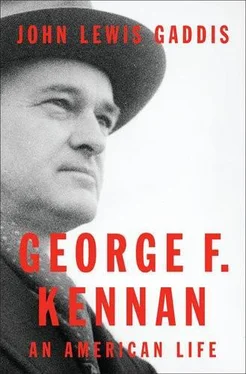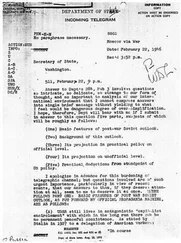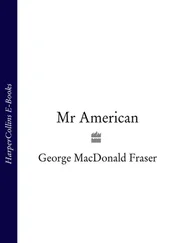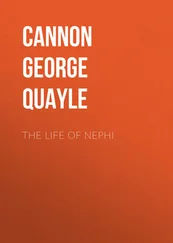That requirement provoked an early outburst of intellectual independence. George disliked the course and began cutting classes. He thought it silly to have to identify plots and climaxes in Shakespeare—“you either felt these plays as aesthetic and intellectual experiences or you did not.” Called in by his instructor, who wanted to know, “bluntly but not unkindly, what the hell was the matter with me,” George professed repentance. He then submitted a paper on what was wrong with the teaching of English in American colleges. It got the highest grade possible, and “I was taught an unforgettable lesson in generosity and restraint.” 23
George knew none of his teachers well, but he appreciated what some of them did. Like several generations of Princeton undergraduates, he relished the legendary Walter P. “Buzzer” Hall—so called for the sound his hearing aid made—who would arrive in a horse and buggy to teach modern European history, thunder through his lectures, and then end the semester with a masterpiece on Garibaldi that pulled in students from all over the campus. There was a philosophy professor who gained George’s respect by allowing students to argue with him after his lectures: “Anyone who can ex[c]ite three or four hundred blasé easterners so that they emerge from their frigid cells… has got to be good.” And then there was a German professor, short, stout, with close-cropped hair and a red mustache: “When he starts to speak German, he swells up, raises his head, glares at the class, draws a deep breath, and then bursts out in stenatorian [ sic ] tones, punctuated by a full measure of the spluttering and gurgling [which] accompanies the pronunciation of good German.” 24
Literature, inside and outside of class, sparked the greatest interest, especially contemporary American novels: “I was thrilled with these books.” Princeton may not have lived up to the reputation Fitzgerald had given it, but Sinclair Lewis’s Main Street put George back in touch with his midwestern roots. “[I]t was an enormous eye-opener to me that one could look at our lives and see drama.” And then, as George was graduating, The Great Gatsby came out, “went right into me and became part of me.” 25
History, apart from “Buzzer” Hall, was disappointing. Too many instructors contented themselves with assignments like: “Read Chapter Twenty-Three, and be prepared to recite on it next week.” It made a difference when the students encountered what they found interesting. Charles Seymour’s Woodrow Wilson and the World War was “fortunately small enough to be read conveniently in chapel,” where attendance was mandatory, “and I covered some fifty pages of it during that ceremony, this morning.” Only one other history teacher held George’s interest: he was Raymond J. Sontag, then a preceptor but later a distinguished diplomatic historian. “[S]keptical, questioning, disillusioned without being discouraging,” he left an indelible impression. Many years later, having himself entered the profession, George recalled of his Princeton years: “I didn’t realize how interesting history was!” 26
So too, in a way, were current affairs. George carefully recorded the consensus reached in a Clio debate on Japanese exclusion. He composed, but did not send, a sardonic letter to the Princetonian on the Veterans’ Bonus Bill. He wrote an essay on plans for construction of the St. Lawrence Seaway. He wrestled, in his international law class, with a case involving Soviet claims to property in the United States—an issue he would return to in an official capacity a decade later. He participated in a student discussion on German reparations, which veered off into wild plans for joining the French Foreign Legion, and then ended in “a general row on international politics” lasting much of the night. Princeton left him with “a vague Wilsonian liberalism; a regret that the Senate had rejected American membership in the League of Nations; a belief in laissez-faire economics and the values of competition ; and a corresponding aversion to high tariffs.” Otherwise, there were few “settled opinions, conclusions, or certainties in the field of public affairs.” 27
There was, however, a mounting concern that his undergraduate years might be his best: “I can readily see how, after one gets out into the world, regardless of what he may have intended, he will never learn anything again, and his interests will be absolutely limited to what he has learned.” Time spent on courses was therefore precious—but not so precious that it prevented George from writing this letter to Jeanette in an English class, where he was supposed to have been taking notes on the lecture. 28
Much about Princeton was exciting—even if English lectures were not—and in more ways than his memoirs suggest, George was becoming fond of the place. “I’m devilish busy,” he wrote early in his sophomore year. He was taking six courses, had a job addressing envelopes for an Italian tailor, and felt like a swimmer trying to keep his head above water. “But I’ve become quite a stoic: I play not; neither do I smoke; yet the Phoenix in all his glory never took any colder baths than I do in the mornings.” 29
He now had a room on campus and was facing distractions that tested stoicism. When Princeton beat Chicago in football that fall, Nassau Street filled with celebrating students, “acting as if they had lost all semblance of intelligence.” George was one of them. “I don’t often get drunk, but I do think that was a worthy occasion.” Then came an unexpected free trip to the Harvard game in Cambridge, causing George to write Jeanette exuberantly: “I just sort of bubble over. Can you imagine that? Last year I felt so lonely.” There were even theater parties in New York, requiring excuses for why he had to return to Princeton “when I was asked to stay all night.” 30
George was a bit stoic when it came to women. He assured Jeanette that he had not arrived at Princeton “a prude.” But he later could recall asking only one girl to a dance there, and it turned out to be an unhappy experience because nobody else danced with her. When George revealed one day that he thought he was in love, his junior-year roommate assured him “that a man can have any woman he wants, if he only wants to take the trouble.” George reported this to Jeanette with scarcely concealed envy: he “sleeps until noon if I don’t wake him;… writes to fifteen girls, and knows fifteen more; has two invited down to the Junior prom and still doesn’t seem the least bit worried about it; and believes in Prohibition but can hold half a pint of gin with perfect sobriety…. Only a southerner could carry that off.” 31
Whatever the state of his love life, spring in Princeton could make it hard to study. Seniors singing on the steps of Nassau Hall moved him so deeply that he wanted to ban all phonographs, automobiles, and other recent inventions from the campus, “because they mar the effect.” But when a classmate abandoned it all to become a sailor, “Lord, how I wanted to go with him.” George did not expect Jeanette, “being a girl,” to understand that the world beyond Princeton, now colorful and romantic, would by the time he graduated be drab and meaningless. He wanted to see it, even if penniless. He didn’t go, though, because “I have too much regard for Father.” At least “I’m not so impressionable as I was at this time last year.” 32
“Took the history quiz this morning,” George wrote on May 24, 1924, in the diary he was now keeping again. “Also had my picture taken for a passport.” It was George’s first, since they had not been required when his family took him to Germany in 1912. The photograph shows a serious young man in coat and tie with a thick head of hair, close-cropped above the ears. Most striking are the eyes, which are large, almost haunted, and suggestive of vulnerability. Which perhaps accounts for another comment George wrote in his diary that evening: “They [his classmates] laugh at me, I know, but I don’t mind being laughed at as much as I used to.” 33
Читать дальше












